Pete Doherty: The rise and survival of the king of chaos
The musician publishes a fast-paced book in which he crudely recounts his collapse and an exciting time of indie rock
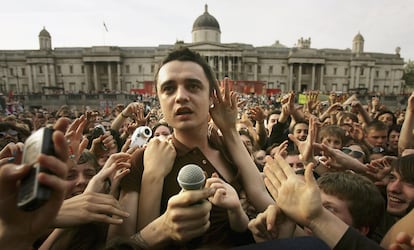
Pete Doherty’s older sister, AmyJo, has not read her brother’s memoir. She has a sense of foreboding that prevents her from reliving Doherty’s wild and often sordid world: “When you have experienced everything so closely… I don’t know if I want to remember it. Maybe one day... My mother read it before it was published and said, ‘Pete, are you sure you want to tell that?’ My father hasn’t read it either. And I hope he never does,” AmyJo Doherty tells this newspaper.
There was a time when this was an ordinary day in the life of Pete Doherty: “At this point I owed this dealer eleven grand, and we had an understanding he was going to take a photo of me banging up and sell it to write off this drug debt.” This is how the musician describes it in Pete Doherty: A Likely Lad, a fast-paced book about the figure who was once omnipresent on four fronts: music magazines, fashion publications, tabloids and in the gossip pages, especially because of his courtship with the model Kate Moss.
Pete Doherty represents a key figure in pop culture in the first decade of the 2000s. As a musician fronting bands like The Libertines and Babyshambles, he was bold, impetuous, the perfect link between the dramatic romanticism of The Smiths and the sonic rage of The Clash. As a media figure, he served as the perfect target for a British press eager to tell about the disastrous lives of the famous: no character has crumbled in public as slowly as he has. The surprising thing is that Doherty, born in Hexham, England, is still alive. Today he is 44 years old. He has not taken drugs for three years, and he lives a quiet life in France. He was married in 2021, and last year he released his bucolic album The Fantasy Life of Poetry & Crime. But there was a time when the musician fell to depths of mental and physical decline.
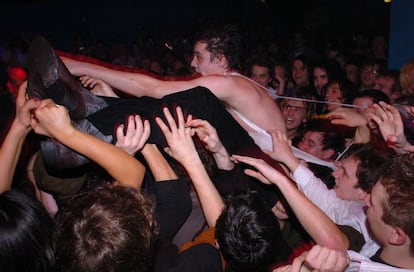
A Likely Lad is written with the help of British journalist and historian Simon Spence, who has published books on Stone Roses, Depeche Mode and Happy Mondays. Spence transcribed, ordered and shaped hours of their conversations. “Pete was humble, confident and patient with me. I found his ability to laugh at himself endearing. We wrote the book during lockdown, when he was completing a year of recovery from his drug addiction, so he was fragile at times, yes. One early morning stuck with me: he delivered an amazing monologue about his rehabilitation attempt at a reputable center in Thailand, in 2004. It was an hour of lurid stories. I was shocked. I was just hoping that my recorder would not fail,” Spence tells EL PAÍS. Among the things that Doherty recounts about that trip, which he did under pressure from the record company and manager: “I wouldn’t say they tricked me into going to Thailand, but I didn’t know what I was getting into. I was yet to try opium or China-white heroin, so the whole idea of getting over to Thailand was quite exciting. I remember being at Heathrow Airport and not exactly thinking I was cool but thinking I was hot stuff for openly smoking crack in the departure lounge. I really had this sense of being untouchable — I’m going to Thailand and I’m smoking crack at the airport and the world’s my oyster sort of vibe.”
Pete Doherty always wanted to be famous. “From a very young age, I wanted, almost desperately, to appear on TV,” he expresses in the book. That desire arose from a desire for recognition, especially from his father, a soldier clinging to some conservative codes. In that military environment, the soldier Doherty met the musician’s mother, an army nurse. “I wanted his love,” the musician says in the book about his relationship with his father. The family moved around frequently, following the father from Belfast to Germany to Cyprus and around the United Kingdom. On Sundays they attended mass, to the satisfaction of the mother, a devout Christian. This environment forged Pete’s rebellion. In addition to his sister AmyJo (a year older) he had another younger sister, Emily. “Although my parents were not musicians, we were always listening to music at home. My mother really liked Motown, Stevie Wonder and Gladys Knight, and my father liked the Kinks, the Small Faces, country... I remember a time when Pete loved Wham! and Pet Shop Boys,” says AmyJo. But the first band that struck Doherty’s heart was Morrissey’s Smiths.
He also applied himself to reading: a lot of leftist essays, in addition to Sartre, Beckett, Joyce, Brecht, Keats, Lord Byron, Genet, Cocteau, Orwell and Bukowski. He also enjoyed French New Wave films, and he began to develop a yearning for poetry. And he wrote. Doherty today sees his fervor for John Keats and Oscar Wilde as having a lot to do with his drive to try heroin. “A drowsy numbness pains my sense, as though of hemlock I had drunk, or emptied some dull opiate to the drains,” Keats wrote.
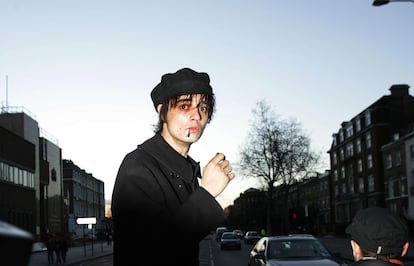
In the mid-nineties, Doherty devoted himself, like almost everyone else, to Brit-pop. He didn’t like Oasis; rather, he was drawn to second-tier bands like Supergrass, Super Furry Animals and Ocean Color Scene. He bought the New Musical Express magazine and fantasized about occupying the cover one day, something he achieved on several occasions. And AmyJo introduced him to Carl Barat, with whom he formed The Libertines. His older sister also offered him his first joint. “That has been a painful issue in the family, especially for my mother. Because he says it was all my fault. Many people assume that smoking weed is the beginning of the journey to drugs. Sometimes I have felt guilty about it. But that was almost natural: I discovered joints and I wanted to show it to my brother. We are only a year apart,” explains AmyJo. It was the early 2000s. Just as The Libertines began to seriously rehearse, he tried heroin for the first time.
A response to The Strokes
The group was initially born as an English version of The Strokes, who at that time were triumphing with their debut album, Is This It (2001). They had brought the glamor back to rock and roll. Doherty describes in his memoirs how powerful he felt in those early days: “A Molotov cocktail in one hand and an electric guitar in the other.” It was an exciting time. There were many groups with one mission: to record the perfect song. There was Franz Ferdinand, Arcade Fire, Bloc Party, Interpol, The Strokes, Arctic Monkeys, The Kooks and The Libertines. “There is a major impact of The Libertines in the British music underground: their closeness to the fans, their impromptu concerts, offering songs on the internet immediately after being recorded. It was all very revolutionary at that time. In addition to being fundamental in the resurgence of guitar bands after the decline of Brit-pop, they were didactic in terms of pop references and at the same time anarchic,” says the British journalist and writer Declan Ryan, a regular in The Guardian, The Observer and the Times literary supplement.
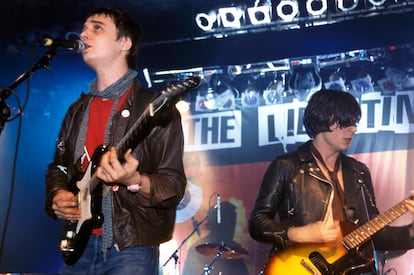
Before they released their debut in 2002, the members of The Libertines were already staring insolently from the cover of New Musical Express: ravishingly young, in tight Fed Perry polo shirts and leather jackets. Their first songs were stimulating: ramshackle and urgent, they ended in catchy choruses, led by high-flying literary lyrics. Time for Heroes, Up the Bracket and Don’t Look Back into the Sun still sound fresh today. Internally, Doherty’s explosive lifestyle was like an army of termites. The relationship between the two leaders was breaking down. Carl Barat consumed mostly cocaine, Doherty took to crack, ketamine, and heroin, smoked and injected. It was a good creative team, but their moments of inspiration lasted less and less.
And the chaos began. They fought on stage, missed rehearsals and gave concerts on their own. The group decided to expel Doherty, who in a rage created Babyshambles. On one of his nights of alienation, Doherty broke into Barat’s house and stole several things: a DVD player, a laptop, a guitar, and some money. Pete ended up in jail for burglary and robbery. He would continue visiting the institution for years, always with small sentences and usually for reckless driving and drug possession. His relationship with prison was similar to the one he had with rehab centers: he entered, stayed for a few days and returned to the streets unchanged.
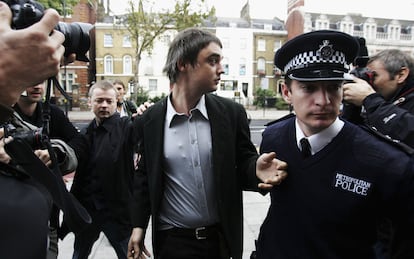
In A Likely Lad, Doherty confesses that for a time, in addition to using, he worked as a mule. The book contains dozens of shocking episodes: the musician lived anywhere, surrounded by junkies and playing in the back rooms of clubs to get drugs. A handful of paparazzi documented his collapse. AmyJo recounts the consequences: “We had a terrible time, like any family that has to deal with addiction. It is a horrible problem, and it was continuously in the press. My father’s name is the same, Peter Doherty, so he always saw his name next to the horrible things they said. He suffered a lot at work, out of shame. Now my brother and I can laugh at some of the headlines, even though it was a very dark time.”
His courtship with the model Kate Moss was the icing on the cake for the press. “They were constantly calling and offering me money to tell them things. And Peter would say to me: ‘Why don’t you tell them that you gave me my first hit of heroin? Tell them that, even if it’s false...’ He is like that. But I have always had a little more awareness: I told him that our parents and grandparents were going to read it. He has zero conscience,” AmyJo says with a laugh. Every week Doherty’s alleged ex-girlfriends appeared sharing gossip in The Sun and Daily Mirror. Meanwhile, the musician attended the Glastonbury festival with Kate Moss, leaving images almost as iconic as those of Kurt Cobain and Courtney Love with their daughter at the MTV awards.
The book includes retellings of encounters with rockstars. At the Coachella festival, as Doherty drinks a bottle of whiskey, he sees Iggy Pop jogging. “He stopped and said something like, ‘I’ve been there, but now I’m into jogging,’ and he was drinking through a straw from a bottle of water.” Another day, backstage at a Rolling Stones concert, which Doherty attended with Kate Moss, Keith Richards told him: “Roll up your sleeve.” He started laughing. Then the veteran guitarist gives him some advice, based on experience: “Try not to go in the vein. You need to get hold of some good-quality stuff, pharmaceutical stuff, and skin-pop it, and then you’re cutting down the risk.”
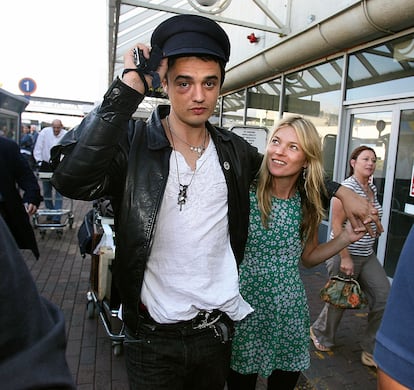
Doherty’s romantic naïveté appears throughout the book. Amidst a cultural industry that only pursues money, he believes in art. He is, in short, a revolutionary spirit. “I had a real belief in poetry and the otherworldliness of music and culture being able to save the world,” he goes on to say. Peter did not like the “industrialization” of a rock group: he preferred to announce a concert in the morning and play at night. Music in its raw and pure state, without intermediaries. Simon Spence says, “Peter is the most important indie rock musician of his generation. His songs, his aesthetic and his lifestyle establish a new concept, one that no one has come close to. History will remember him with good eyes.”
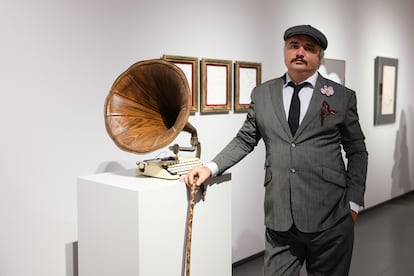
If Doherty’s pace of life scares the reader, the musician himself claims in his memoirs that he is far surpassed by two people who cross his path: Amy Winehouse (with whom he says he had a relationship) and Peaches Geldof, both of whom died from excesses. “It’s a miracle that he’s alive,” assumes his sister AmyJo. “At the worst moments I would almost cheer myself up every morning and say: ‘Well, at least he’s alive.’ I think he is a strong and persistent man.”
Last week, AmyJo, who has lived in Spain for 18 years and is a musician, went to the French house of her brother and his partner, Katia, to meet her niece and the couple’s baby Billie May, just three months old. “He’s a great dad,” she says. In his efforts to solve past failures, the musician has also recovered his relationship with his parents. Perhaps it wasn’t all his fault, as the musician himself insinuates at the beginning of A Likely Lad, citing a reflection by the French poet Arthur Rimbaud: “The idea is to reach the unknown by the derangement of all the senses. It involves enormous suffering, but one must be strong and be a born poet. It’s really not my fault.”
Sign up for our weekly newsletter to get more English-language news coverage from EL PAÍS USA Edition
Tu suscripción se está usando en otro dispositivo
¿Quieres añadir otro usuario a tu suscripción?
Si continúas leyendo en este dispositivo, no se podrá leer en el otro.
FlechaTu suscripción se está usando en otro dispositivo y solo puedes acceder a EL PAÍS desde un dispositivo a la vez.
Si quieres compartir tu cuenta, cambia tu suscripción a la modalidad Premium, así podrás añadir otro usuario. Cada uno accederá con su propia cuenta de email, lo que os permitirá personalizar vuestra experiencia en EL PAÍS.
¿Tienes una suscripción de empresa? Accede aquí para contratar más cuentas.
En el caso de no saber quién está usando tu cuenta, te recomendamos cambiar tu contraseña aquí.
Si decides continuar compartiendo tu cuenta, este mensaje se mostrará en tu dispositivo y en el de la otra persona que está usando tu cuenta de forma indefinida, afectando a tu experiencia de lectura. Puedes consultar aquí los términos y condiciones de la suscripción digital.









































